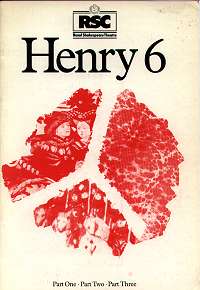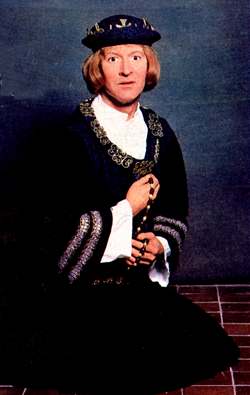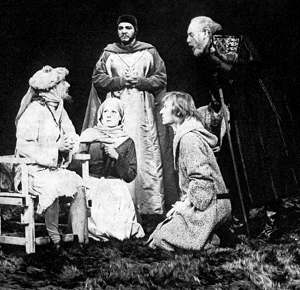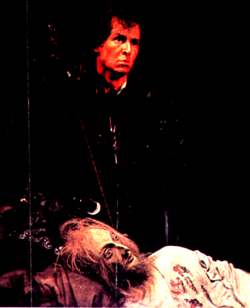
 |
|
"WE ARE amazed." On Saturday some one thousand of us sat in the Aldwych Theatre from 10.30 in the morning till 11.0 at night (with breaks for lunch and dinner) watching the gradual unfolding of the Royal Shakespeare Company's Henry VI trilogy. It was, in almost every sense, a staggering experience; and as one stumbled into the night air after this orgy of deceit, declamation and decapitation (Shakespearean moral: if you want to get ahead, get a head) one felt one had encountered, if not a masterpiece, then certainly a more vital and enthralling Shakespearean work than Romeo and Juliet or As You Like It. "Not as good as The Wars Of The Roses," a colleague emphatically said of Terry Hands's production half-way through the afternoon. But the judgment was both premature and irrelevant. The Hall-Barton Wars Of The Roses was a severely-edited and partially-rewritten account of the plays. Hands's production, however, uses the full text and this has several advantages. It highlights the difference of theme and texture between the three plays. But it also brings out the young Shakespeare's continuing fascination not just with rex but with res publica. Part Two, in particular, seems to me a hitherto unreclaimed masterwork giving one as comprehensive vision of England as you find in Henry IV. What Harold Wilson would doubtless call the governance of the land is, in fact, the abiding theme of these plays. How do you achieve stability when the nobles are all determined to, in the Duchess of Gloucester's ringing phrase, "reach at the glorious gold" and when the commoners ape the anarchy of those higher up the ladder? |
 |
|
But on the private level, one other theme bursts out of these plays when you see them as a group; Shakespeare's preoccupation with the tragedy of fathers and sons. Henry is awed by the shadow cast by his father, Henry V; Talbot cradles his dead son in his arms; and, in the most heart-stirring scene of all, we see a son who has killed his father and a father who has killed his son. If the plays gain by being seen collectively, so too do Terry Hands's productions. He hasn't found an overpowering single image for the three plays, like the diamond-shaped council-table that dominated The Wars Of The Roses. But he has, both here and on the Continent, evolved a style that admirably suits chronicle plays. It's based on a minimal setting, roving spotlights and a bold, frontal style of playing that gives the actors a chance to establish direct lines of contact with the audience. But, looking at Saturday's production singly, the one that has improved most since Stratford is undeniably Part One, the morning's war. This is dominated by Joan of Arc and the English national Hero, Talbot. At Stratford the confusing scrappings of the battles and the constant raising and lowering of a vast bridge led me to think of it as A Bridge Too Often. But now the pace has been tightened, it is always possible to tell who is tactically ahead and both Charlotte Cornwell's wild-eyed, occultish Joan and David Swift's ruggedly decent Talbot have acquired something of the strong, emblematic outline they lacked before: it's as if they're now playing France and England rather than Joan and Talbot. |
|
For me, however, the afternoon's Part Two remains the peak experience. Played on a stretch of green turf, it begins with the crowd contained behind a rope at the back of the stage and the nobles assembling in columns. And what we see is the people bursting on to the green in the Jack Cade rebellion like spectators invading the pitch at Lords and the nobles reduced to savage animalistic clusters; it's a perfect metaphor for a play which is, literally, about breaking ranks. |
|
"Is this the governance of Britain's Isle?" Queen Margaret asks with incredulity and you feel throughout the play Shakespeare's sorrow for this bloodstained Eden. But what is fascinating is the way he shows disorder spreading through society from the top: the Duke of Suffolk has enclosed the Commons of Melford; a Cardinal's man has appropriated someone's wife and property and, given a weak king, the way is open to a populist demagogue like Cade. Only with Part Three do I sense a touch of creative exhaustion on Hands's part. There are fine performances from Julian Glover as the massively manipulative Warwick, Emrys James as the power-hungry York, Anton Lesser as a ferret-eyed, hump-backed Richard and Helen Mirren's Margaret has now acquired blood-lust as well as body-lust. But Alfred Lynch's Edward IV lacks the womanising rapacity that drives this character. The climax, though, is stunning: the murder of Henry VI in what looks like a million watt grille that rises up from the ground and the final image of the barbarous royals trying falteringly and ineffectually to dance. The land has been riven; the crown reduced to a pass-the-parcel plaything; and what we are left with is a fragmented dance to the broken music of time. |
 |
I have, however, left out of account the performance that underpins this trilogy and that, as the day progresses, grows into a thing of beauty and wonder; Alan Howard's Henry VI. At the start he is a bewildered child, head swivelling like a Wimbledon umpire's as he listens to the barrage of arguments: perhaps a little too self-consciously simple in moments like his frightened start at the prospect of marriage. But he makes something indubitably thrilling of the discovery that he can exercise adult sway and something infinitely moving of his realisation that justice and right are merely abstract concepts.
John Wain once wrote that "deep down every man thinks of himself as a dispossessed king," but Howard reverses this and presents us with a king who thinks of himself as a dispossessed human being. As sons and fathers lament at mutual slaughter, Howard sits sorrowing downstage, emotion passing over his face like clouds over the sun.And when he comes to the lines, "I was annointed King at nine months old. My Father and my Grandfather were Kings" he makes this simple statement of fact an unbearable cry of pain. This is the supreme irony of Hands's breathtaking production. Everyone is reaching at the Glorious gold: only he who has it knows its real worth.
|
Michael Billington. The Guardian, 21.4.78. |
 |